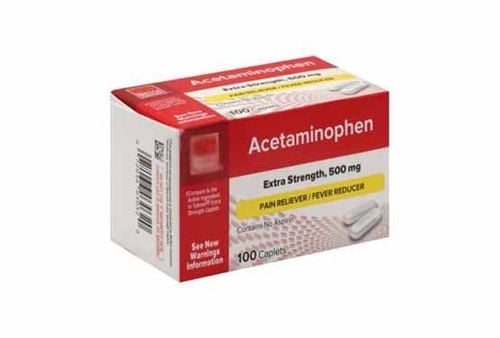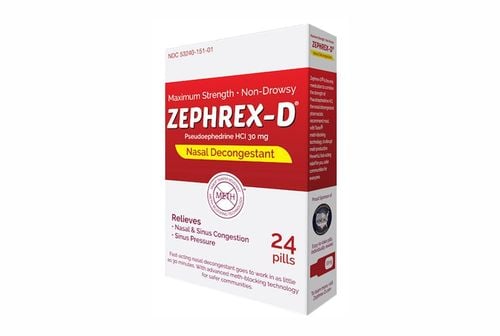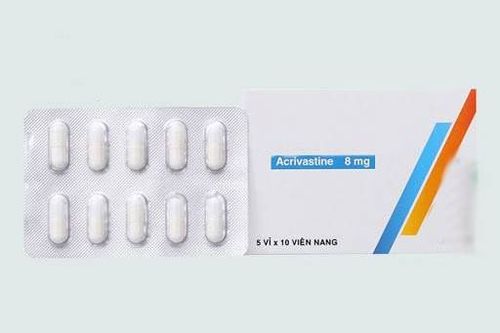This is an automatically translated article.
Drugs Acrivastine and Pseudoephedrine are drugs to treat respiratory diseases, allergies. Both drugs can easily interact with foods and drugs that cause nervous breakdowns. Therefore, patients should carefully read the instructions and consult a doctor before use.
1. Uses, dosage and usage of Acrivastine
Acrivastine is classified in the H1 antihistamine class. The drug is produced in the form of 8mg capsules. One of the excipients contains an extract of 60 mg of Pseudoephedrine hydrochloride.
1.1 Instructions for using the drug according to the use and object According to research from the hydrochemical analysis, Acrivastine drug has the ability to reduce symptoms such as allergic rhinitis, chronic idiopathic urticaria. Besides the indicated use, patients with a history of hypersensitivity to any ingredient of the drug should pay attention not to use it if there is another choice. Because this drug is excreted by the kidneys, when excreted as metabolites, it is easy to reduce renal function. Therefore, patients with a diagnosis of severe renal failure or children under 12 years of age are contraindicated groups of the drug.
Acrivastine should be used with extreme caution when used by pregnant women, nursing mothers, workers working with machinery or driving vehicles. This group of subjects may have problems with dizziness, fatigue affecting health and work. Especially patients with glaucoma, urinary retention, prostate enlargement, epilepsy, liver failure....be careful when taking the drug and always check your health periodically to control the drug's effects.
1.2 Dosage of Acrivastine Drug Dosage will be prescribed according to age and actual medical condition.
At the age from 12 to 65 years old should take 8mg / time and maintain it 3 times a day. Elderly people after 65 years of age need to be examined and prescribed by a doctor according to their current condition. Children from 12 years of age can take the same dose as adults, but should minimize the use of drugs if not necessary. Currently, the side effects after taking Acrivastine in children are not worrisome, but still need to be observed and studied further.
The drug will work best when you do not take it too close to a meal. Accidentally forgetting a dose or taking an overdose can affect the effectiveness of the drug, even lead to poisoning due to the toxicity being metabolized to invade the body. When you experience drowsiness, lethargy, depression or heart rhythm disturbances, you should notify your doctor to determine the cause. Workers who operate machinery or drive long vehicles can pay attention to their mental health while working to detect abnormalities in time.
In case of accidental overdose, medical intervention is required to neutralize the drug due to high dose. In case of missed dose, skip the missed dose or take it immediately if the missed dose is far from the next dose. Never double the dose of the drug, because it leads to dangerous problems for health and recovery of the disease.
1.3 Mechanism of action and interactions Acrivastine drug after oral administration will be absorbed by the small intestine to handle the body's problems. In the first 1.5 hours after taking the drug in the blood will reach the highest threshold. They will be converted into other substances at a small rate when they reach the excretory system. Therefore, urine can be the basis for checking the concentration of the drug excreted and determining the extent of metabolism of the drug component. Excretion takes place mainly in the kidneys. When using the drug, you should avoid taking it with other antipsychotics.
Alcohol is the cause of fatigue, loss of behavioral control. When using drugs in combination with the use of alcoholic beverages, it will cause intellectual impairment, and affect the motor ability of the muscles. Some studies suggest that you should limit your intake of grapefruit juice while on medication. because they can be dangerous.
2. Uses, dosage and usage of Pseudoephedrine
Pseudoephedrine is part of the drug Acrivastine. It is also a medicine used to clear the nose and dilate blood vessels in the nose. You can use this medicine to relieve nasal congestion caused by sinusitis, a blockage of fluid in the ear canal.
2.1 Who can use Pseudoephedrine Pseudoephedrine should not be used by children under 4 years of age and should consult a doctor when in need of cough or cold treatment. Parents should consult the doctor who is monitoring the baby's disease to know the risks as well as how to use the drug effectively. In particular, you can ask your doctor for a list of drugs or foods that interact with Pseudoephedrine to reduce the risk of serious side effects.
When you belong to a group of patients with medical conditions such as heart disease, blood sugar or thyroid disorders, carefully ask your doctor about the safety of using the drug. Doctors and researchers have not yet discovered the effects of Pseudoephedrine on pregnant and breast-feeding women. However, the drug can also enter the milk ducts and affect the nursing baby's body.
2.2 How to take Pseudoephedrine Before taking Pseudoephedrine, the patient should carefully read the instructions and determine if he has any allergies. corresponds to any of the ingredients listed in the drug. In addition, let your doctor know what drugs and supplements you are taking so that the dosage can be adjusted accordingly.
Pseudoephedrine should not be used for too long. Overuse can affect the use and condition of the disease.
When drinking water, you need to remember to drink with a full glass of water and take the whole pill. The time for a course of treatment usually does not last more than 7 days as prescribed by the doctor.
2.3 Interactions and side effects of Pseudoephedrine When you are being treated with Pseudoephedrine, avoid taking it with weight loss pills or foods containing stimulants. These factors make stuffy nose worse and increase the risk of dangerous side effects. If you are being treated with cough or cold medicine, talk to your doctor to consider optimal medication. You need to self-monitor your health throughout the course of medication to assess recovery or detect unexpected signs early.
For people with allergies, after using Pseudoephedrine, the skin will have a rash, followed by swelling in the face or making it difficult to breathe. Some studies suggest that arrhythmia, dizziness, anxiety, vascular damage, flu, colds, muscle aches, blood pressure disorders... are common and quite dangerous effects. while taking this medicine. In some cases, it can cause sleep disturbances, heat in the body, skin rashes, but quite rarely.
2.4 Dosage of Pseudoephedrine For adults: Adults with immediate treatment can take Pseudoephedrine with a dose of 20 - 60 mg. Each time should be taken 4-6 hours apart. When you need to take maintenance can take 120 mg and 12 hours apart. No more than 240 mg per day for adults. For young children: In young children should not be used in groups under 4 years of age, unless directed by a doctor. The immediate dose is 15 mg 6 hours apart. If used long-term will maintain 12.5 - 25 mg. This age should not take more than 60 mg. Some may use a 1mg/kg/dose formulation and use it for immediate dosing. However, you should ask and take as prescribed by your doctor to make sure the medicine works best. The drug Acrivastine and Pseudoephedrine have in common is the treatment of respiratory diseases, allergies. However, both drugs are susceptible to interactions with food and other psychoactive drugs. Therefore, patients should pay attention to carefully study the drug information, as well as report to the doctor the drugs they are taking, the history of allergies and illnesses they have had to have the most appropriate treatment plan and use the safest drug.
Please dial HOTLINE for more information or register for an appointment HERE. Download MyVinmec app to make appointments faster and to manage your bookings easily.
Reference sources: drugs.com, bcare.vn,












